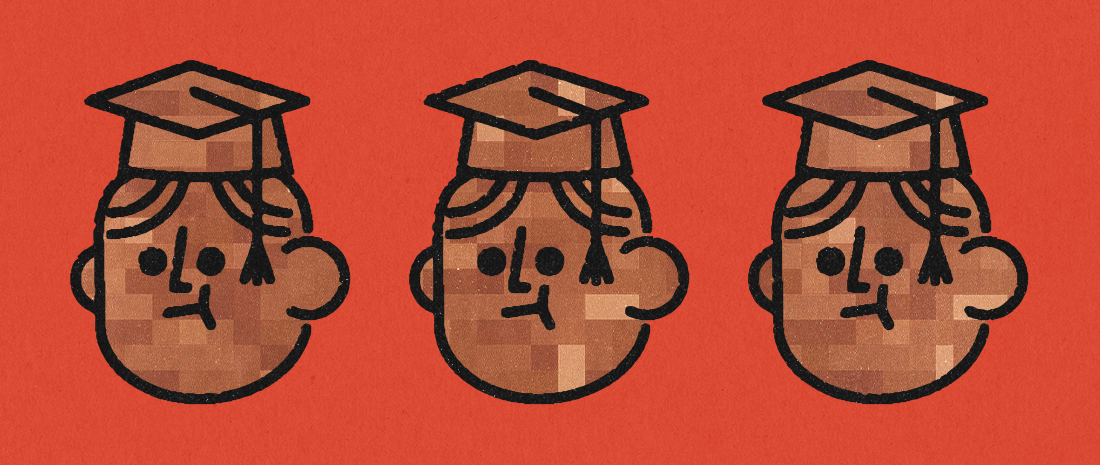
The question of “So, what are you, anyway?” has plagued me throughout my entire academic career, and I have yet to encounter a mixed-race peer — whether in elementary school, high school, or university — who has not been asked it at least once.
In one of my earliest memories of racism, a young classmate told me that he was surprised that I was so good at math — a common stereotype associated with Asian people — because I “looked white.” After a decline in my mathematical abilities later in life, I recall another classmate telling me that he was surprised I was bad at math because he “thought I was Asian.”
Whether I’m white, Asian or something else entirely is what I’ve been struggling with ever since.
There’s something about having ethnically ambiguous features that invites people to question your racial heritage, regardless of how well they know you. And there’s something about the constant questioning that makes you question yourself, too.
Psychological studies have shown that biracial stereotypes — including that biracial people do not fit in or belong — are pervasive across biracial peoples regardless of their parents’ races.
Since coming to university and meeting more biracial people, I’ve realized that most of us can relate to this biracial struggle of not belonging, though there is diversity in how we experience it.
In my experience, depending on who you ask, I’m white-passing. As a result, it means that I navigate university with more white privilege than other academics of colour.
For example, at the University of Saskatchewan, there has been a pattern of Indigenous professors quitting, citing racism as one of their reasons for leaving. I’ve also heard stories from my peers of colour about their racist experiences in U of S classrooms, including having their ideas overlooked or feeling racially profiled for their skin colours.
Because I experience white privilege in ways that some academics of colour do not, it begs the question — Am I white?
But one of my struggles as an academic has been my last name — Tran — one of the most common last names in the Vietnamese language. When I send out my resume within academic circles, my last name jumps out because it isn’t white. I’ve even jokingly been told that my applications have almost been passed over because they weren’t sure that I would have the language skills for a particular position.
It also means that, upon showing up for interviews in the past, I’ve seen the look of surprise on interviewers’ faces, like they’re expecting someone fully Vietnamese.
I’ve struggled with this in the past, knowing that racist employers may disregard my application, regardless of my credentials, simply because they know I am a person of colour. On the other hand, I’m well aware that my biracial friends with white-passing last names may get an interview I’m not even considered for.
At one time, this struggle to accept my last name amongst the reality of racism caused me to abandon my last name altogether in favour of my white-passing middle name. However, self-reflection and cultural connection have thankfully led me to abandon this pursuit later in life.
In another realm of academia, research on scholarship application selection has shown that biracial applicants are less likely to be considered for racial minority scholarships. Furthermore, applicants who have more white ancestry are often perceived as less deserving of these scholarships than those with less white ancestry.
This, too, has plagued me when applying for scholarships, making me doubt whether I am even allowed to call myself a Vietnamese academic in the first place. If I do not qualify for racial minority scholarships, it makes me wonder — Am I Asian?
This brings me back to that dreaded eternal question.
“So, what are you, anyway?”
The biggest breakthrough for me as a biracial academic has been realizing that I do not have to be two halves of a whole. I now see that my white and Vietnamese identities are not at odds with one another.
More importantly, being biracial is not always about the struggle — embracing my heritage allows me to celebrate the unique voice I bring to academia.
And in realizing this, I realize that the answer to the age-old question of what I am doesn’t matter nearly as much as who I am.
Regardless of my mathematical ability, the features of my face I inherit from either parent or the names I go by depending on the language I am speaking, I can be proud of my heritage and how it contributes to my academic work — and that is enough for now.
—
This op-ed was written by a University of Saskatchewan undergraduate student and reflects the views and opinions of the writer. If you would like to write a reply, please email opinions@thesheaf.com. Hannah Tran is an upper-year undergraduate student studying Psychology and English and is the Editor-in-Chief at The Sheaf Publishing Society.
Graphic: Jaymie Stachyruk | Graphics Editor
Leave a Reply